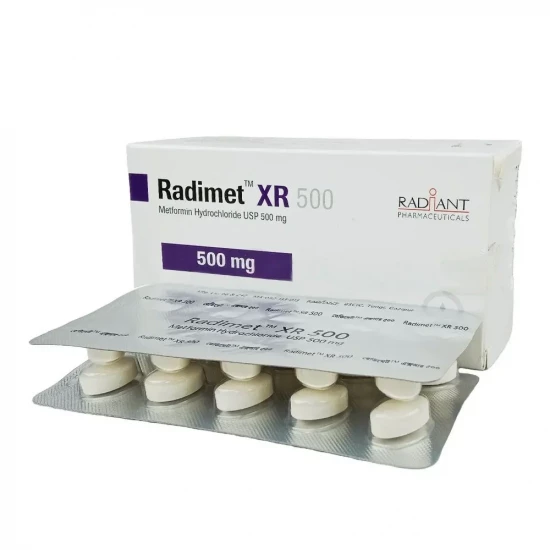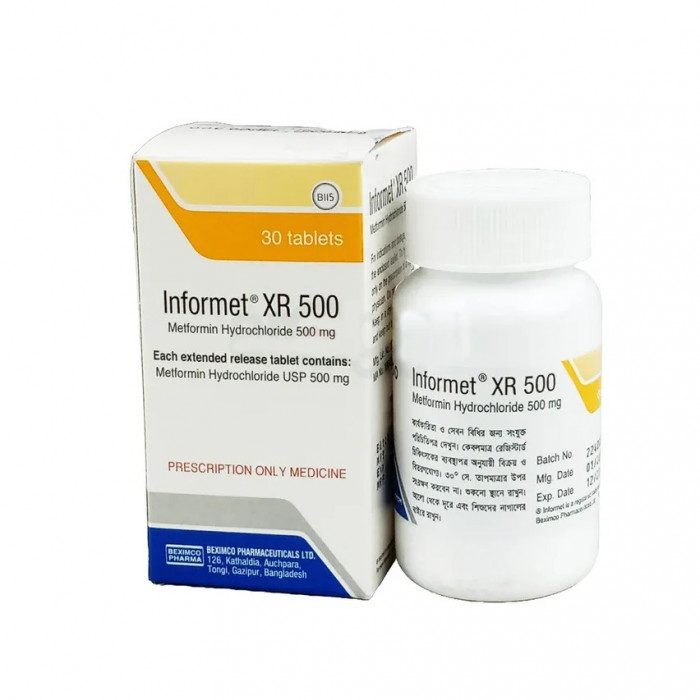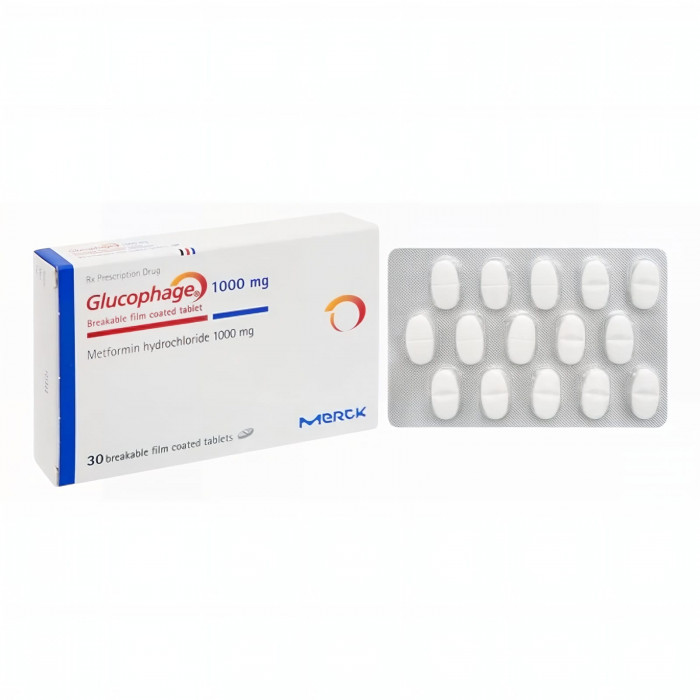
✔ 100% Authentic Product
👁️ Currently Viewing 570
Metform ER is prescribed for the management of type 2 diabetes mellitus, particularly in overweight patients where diet and exercise alone do not provide adequate glycemic control.
Adults: Can be used as monotherapy or in combination with other oral antidiabetic agents or insulin.
Children (≥10 years) & adolescents: May be used alone or in combination with insulin.
Long-term studies have shown that metformin as first-line therapy reduces diabetic complications in overweight type 2 diabetic adults after dietary management has failed.
Discount
Price: ৳ 57
MRP:
৳
60
5%
Off

100% Genuine Products, Guaranteed

Safe & Secure Payments, Always

Fast, Secure & Efficient Delivery

Proper Packaging
 Cash on Delivery - All over Bangladesh
Cash on Delivery - All over Bangladesh Regular Delivery - 12-24 Hours, Dhaka City* Charge Tk.39-59
Regular Delivery - 12-24 Hours, Dhaka City* Charge Tk.39-59 Regular Delivery - 24-48 Hours, Other Cities* Charge Tk.99-110
Regular Delivery - 24-48 Hours, Other Cities* Charge Tk.99-110
🌙 রমযান অফার 🌙
 ফ্রি ডেলিভারিঃ - ৭৯৯ টাকা+ অর্ডারে, ঢাকা
শহরে
ফ্রি ডেলিভারিঃ - ৭৯৯ টাকা+ অর্ডারে, ঢাকা
শহরে ফ্রি ডেলিভারিঃ - ২৭৯৯ টাকা+ অর্ডারে, ঢাকার
বাহিরে
ফ্রি ডেলিভারিঃ - ২৭৯৯ টাকা+ অর্ডারে, ঢাকার
বাহিরে
📲 মোবাইল অ্যাপ অর্ডারে সাশ্রয় বেশী
-
Google Play Store থেকে ডাউনলোড
-
Apple Store থেকে ডাউনলোড
100% Genuine Products, Guaranteed
Safe & Secure Payments, Always
Fast, Secure & Efficient Delivery
Proper Packaging
 Cash on Delivery - All over Bangladesh
Cash on Delivery - All over Bangladesh Regular Delivery - 12-24 Hours, Dhaka City* Charge Tk.39-59
Regular Delivery - 12-24 Hours, Dhaka City* Charge Tk.39-59 Regular Delivery - 24-48 Hours, Other Cities* Charge Tk.99-110
Regular Delivery - 24-48 Hours, Other Cities* Charge Tk.99-110 ফ্রি ডেলিভারিঃ - ৭৯৯ টাকা+ অর্ডারে, ঢাকা
শহরে
ফ্রি ডেলিভারিঃ - ৭৯৯ টাকা+ অর্ডারে, ঢাকা
শহরে ফ্রি ডেলিভারিঃ - ২৭৯৯ টাকা+ অর্ডারে, ঢাকার
বাহিরে
ফ্রি ডেলিভারিঃ - ২৭৯৯ টাকা+ অর্ডারে, ঢাকার
বাহিরে- Google Play Store থেকে ডাউনলোড
- Apple Store থেকে ডাউনলোড
🌙 রমযান অফার 🌙
📲 মোবাইল অ্যাপ অর্ডারে সাশ্রয় বেশী
✅ Description:
Metformin belongs to the biguanide class of oral antihyperglycemic drugs. It lowers both fasting and postprandial plasma glucose levels without stimulating insulin secretion, thereby preventing hypoglycemia.
Mechanisms include:
- Suppression of hepatic glucose production.
- Reduction of intestinal glucose absorption.
- Enhancement of insulin sensitivity, leading to increased peripheral glucose uptake and utilization.
✔️ Dosage & Administration
Immediate-release (IR) tablets:
Adults: Start with 500 mg twice daily or 850 mg once daily with meals. Increase by 500 mg weekly or 850 mg every 2 weeks as tolerated, up to 2000 mg/day in divided doses. Some patients may require up to 2550 mg/day.
Children (≥10 years): Begin with 500 mg twice daily with meals. Titrate weekly in 500 mg increments up to a maximum of 2000 mg/day in divided doses.
Extended-release (ER) tablets:
Swallow whole, do not crush, cut, or chew.
Adults: Start with 500 mg once daily with the evening meal. Increase in 500 mg increments weekly as needed, up to 2000 mg once daily, or 1000 mg twice daily with meals. Patients on IR may be switched to ER up to equivalent maximum doses.
Children: ER formulation has not been adequately studied in pediatrics.
Renal impairment: Contraindicated if eGFR <30 mL/min/1.73m². Reassess risk/benefit if eGFR falls below 45.
Elderly: Dose adjustment required; renal function should be closely monitored.
Pediatrics (10–12 years): Limited long-term data on growth and puberty—monitor closely.
Renal impairment: Contraindicated if GFR <30; monitor GFR annually (more often if near the lower limit).
✔️ Side Effects
Very common: GI disturbances (nausea, vomiting, diarrhea, abdominal discomfort, anorexia).
Common: Taste disturbances.
Very rare: Hepatic dysfunction, skin reactions (erythema, pruritus, urticaria).
Not known: Hemolytic anemia, encephalopathy, and peripheral neuropathy linked to vitamin B12 deficiency.
Long-term use: Reduced vitamin B12 absorption may lead to megaloblastic anemia.
Serious but rare: Lactic acidosis (medical emergency).
✔️ Interaction
- Cationic drugs (e.g., amiloride, digoxin, morphine, procainamide, quinidine, quinine, triamterene, trimethoprim, vancomycin) may compete for renal tubular secretion, potentially altering clearance.
- Nifedipine may increase metformin absorption.
- Drugs that raise blood glucose (thiazides, corticosteroids, phenothiazines, thyroid hormones, estrogens, oral contraceptives, phenytoin, nicotinic acid, sympathomimetics, calcium channel blockers, and isoniazid) may reduce glycemic control.
- Cimetidine may decrease renal clearance of metformin—dose adjustment may be needed.
✔️ Contraindications:
- Known hypersensitivity to metformin or excipients.
- Severe renal impairment (eGFR <30 mL/min/1.73m²).
- Acute metabolic acidosis (lactic acidosis, diabetic ketoacidosis).
- Conditions predisposing to hypoxia (e.g., cardiac or respiratory failure, recent MI, shock).
- Severe liver impairment, alcoholism, or acute alcohol intoxication.
- Acute illness with risk of dehydration, severe infection, or shock.
✔️ Pregnancy & Lactation
Pregnancy: Uncontrolled diabetes in pregnancy raises the risk of congenital abnormalities. Insulin is preferred for glycemic control during pregnancy; metformin is generally not recommended.
Breastfeeding: Metformin is excreted in breast milk. While no adverse effects in infants were reported, data are limited; breastfeeding during therapy is not recommended.
✔️ Precautions & Warnings
- Risk of lactic acidosis increases with renal impairment—renal function should be checked regularly.
- Monitor vitamin B12 levels annually with long-term therapy.
- Stop therapy 2–3 days before surgery or radiological procedures that use contrast media, and restart only after renal function has normalized.
- Use cautiously in conditions causing dehydration, infections, trauma, or in combination with insulin/sulfonylureas (risk of hypoglycemia).
✔️ Storage:
Store below 30°C, away from light and moisture. Keep out of reach of children.
⚠️Disclaimer:
At ePharma, we’re committed to providing accurate and accessible health information. However, all content is intended for informational purposes only and should not replace medical advice from a qualified physician. Please consult your healthcare provider for personalized guidance. We aim to support, not substitute, the doctor-patient relationship.


























